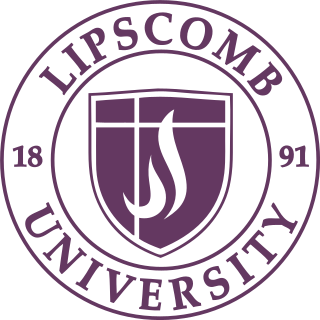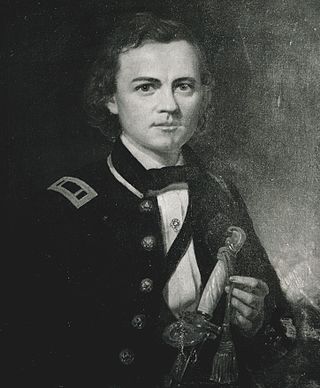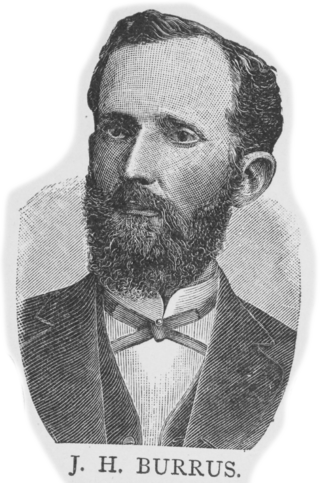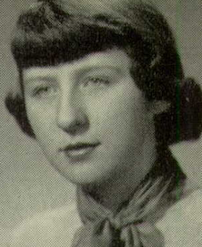Related Research Articles

Belle Meade is a city in Davidson County, Tennessee. Its total land area is 3.1 square miles (8.0 km2), and its population was 2,901 at the time of the 2020 census.

Lipscomb University is a private Christian university in Nashville, Tennessee. It is affiliated with the Churches of Christ. The campus is located in the Green Hills neighborhood of Nashville; it also maintains one satellite location called "Spark" in Downtown Nashville to serve the business community. Total student enrollment for the fall 2022 semester was 4,704, which included 2,955 undergraduate students and 1,749 graduate students.
Frances Elliott Mann Hall was an American educator, school administrator, and one of the five founders of Sigma Kappa sorority. She opened and operated the Hall-Noyes School in Washington, D.C.

Franklin Road Academy (FRA) is a private co-educational Christian school for students in pre-kindergarten through grade 12 located in Oak Hill, Tennessee. The school was founded in 1971 and originally affiliated with the First Christian Church before it became a separate incorporated organization in 1982. FRA has been described as a segregation academy, like other schools established after a court ordered Nashville public schools to expand desegregation busing.
Brentwood Academy is a coeducational Christian independent college preparatory school located in Brentwood, Tennessee, for grades 6–12.

The Metropolitan Nashville Police Department, commonly known in the area as Metro Police, is the primary provider of law enforcement services for Metropolitan Nashville and Davidson County, Tennessee. The MNPD covers a total area of 526.1 square miles (1,363 km2) that encompasses everything from high density urban locations to rural areas.

John Meredith Bass was an American banker, planter and Whig politician based in Nashville, Tennessee. He was active in politics in the city and region. Among his roles was serving as the mayor of Nashville, Tennessee from 1833 to 1834, and again in 1869.
Felix Zollicoffer Wilson (1866–1950) was an American Democratic politician. He served as the Mayor of Nashville, Tennessee from 1921 to 1922.

Thomas H. Malone (1834-1906) was an American Confederate veteran, judge, businessman and academic administrator. He served as the President of the Nashville Gas Company from 1893 to 1906. He served as the second Dean of the Vanderbilt University Law School from 1875 to 1904.

Henry Hamilton Love was a lumberman, sportswriter and humorist who lived in Nashville, Tennessee. He was known as the "Daddy of the Nashville lumberman" and was the first president of the Nashville Lumberman's Club. Love wrote the Hardwood Code, a telegraphic code once used extensively in the lumber trade and that was urged by the Hardwood Manufacturer's Association of the United States.

William Harold Payne (1836–1907) was an American educator and translator. As professor of the Science and Art of Teaching at the University of Michigan in 1879, he was the first university professor of pedagogy in the United States. He served as the chancellor of the University of Nashville and the president of Peabody College from 1887 to 1901.

John Houston Burrus was an educator in Nashville, Tennessee and Lorman, Mississippi. He was a member of the first class of students at Fisk University in Nashville and when that class graduated became among the first group of African-Americans to graduate from a liberal arts college south of the Mason–Dixon line. He was a professor of mathematics at Fisk and in 1883 became the second president of Alcorn Agricultural and Mechanical College, a position he held until 1893.

John Watson Morton was an American Confederate military officer, farmer and politician. Educated at the Western Military Institute, he entered military service soon after graduation, with the outbreak of war. He served as captain of artillery under General Nathan Bedford Forrest in the Confederate States Army during the American Civil War. Afterward he was the founder of the Nashville chapter of the Ku Klux Klan during the Reconstruction era.
Benjamin F. Cockrill Jr. (1866–1936) was an American farmer and politician.

Julia A. Tevis was a pioneer educator of women, from Kentucky. After teaching for several years in Virginia, she founded the Science Hill Female Academy in Shelbyville and led the institution to gain a national reputation for excellence. Teaching her students math and science, rather than how to be accomplished seamstresses, Tevis prepared young women for colleges.

Friedrich Julius Georg Dury (1817–1894) was a well-regarded Bavarian-American portrait artist who worked in both oil and pastel. He was born and educated in Würzburg, Bavaria, and Munich, where he began his career as an artist.

Tipton Female Seminary, also known as Tipton Female Academy, was a female seminary established in 1854 in Covington, Tennessee. It closed sometimes around c. 1894.

Mary Alice "Marice" Moylan Wolfe was an American archivist. She was University Archivist and Head of Special Collections at Vanderbilt University for over 25 years, beginning in 1973.
Jessamine Female Institute was an American finishing school and college for women founded in Nicholasville, Kentucky. It opened in 1855 and closed in 1910.
Bolivar College was a private preparatory school and college in Madisonville, Tennessee. It was established by Rev. Creed Fulton, a founder of Emory and Henry College in Virginia. It opened in 1825 as the Bolivar Academy and became a college in the 1890s. It closed in December 1907.
References
- 1 2 3 4 5 6 7 8 9 10 Owens, Fae Jacobs; Vincent, Patricia; Vaughan, Buchanan Rebecca; Davidson, Faye Tennyson. "History of Bolivar". Visit Historic Bolivar. Retrieved 2024-03-26.
- ↑ "Roger Family Sparked Education". The Commercial Appeal. 1971-08-29. p. 85. Retrieved 2024-03-27– via Newspapers.com.
- ↑ "100 Years Ago". The Commercial Appeal. Memphis, Tennessee. 1940-12-23. p. 6. Retrieved 2024-03-26– via Newspapers.com.
- ↑ "Music Teacher". Nashville Union and American. 1852-05-05. p. 2. Retrieved 2024-03-23– via Newspapers.com.
- ↑ "Bolivar is most assuredly second to no place in the State as regards its educational advantages". Bolivar Bulletin. 1866-02-17. p. 3. Retrieved 2024-03-23– via Newspapers.com.
- ↑ "We are reliably informed the Rev. W. C Gray, the talented and highly esteemed Principal". Bolivar Bulletin. 1866-06-16. p. 3. Retrieved 2024-03-23– via Newspapers.com.
- 1 2 3 "Bolivar Female Academy". Bolivar Bulletin. 1867-01-19. p. 2. Retrieved 2024-03-26– via Newspapers.com.
- 1 2 "Bolivar Female Academy". Bolivar Bulletin. Bolivar, Tennessee. 1874-09-18. p. 2. Retrieved 2024-03-23– via Newspapers.com.
- 1 2 "Bolivar Female Academy". Bolivar Bulletin. Bolivar, Tennessee. 1872-08-30. p. 2. Retrieved 2024-03-23– via Newspapers.com.
- ↑ "Bolivar Female Academy". Bolivar Bulletin. Bolivar, Tennessee ·. 1875-01-29. p. 3. Retrieved 2024-03-23– via Newspapers.com.
- ↑ "Bolivar Female Academy". Bolivar Bulletin. 1875-11-04. p. 3. Retrieved 2024-03-26– via Newspapers.com.
- ↑ "Local News". Bolivar Bulletin. 1896-07-03. p. 3. Retrieved 2024-03-26– via Newspapers.com.
- ↑ "Local News". Bolivar Bulletin. 1896-08-14. p. 3. Retrieved 2024-03-26– via Newspapers.com.
- ↑ "Local News". Bolivar Bulletin. 1896-08-14. p. 3. Retrieved 2024-03-26– via Newspapers.com.
- 1 2 3 "Local News". Bolivar Bulletin. 1903-01-23. p. 3. Retrieved 2024-03-26– via Newspapers.com.
- ↑ "The House". The Tennessean. Nashville, Tennessee. 1901-03-23. p. 5. Retrieved 2024-03-23– via Newspapers.com.
- ↑ "Afternoon Session". The Tennessean. Nashville, Tennessee. 1901-03-29. p. 5. Retrieved 2024-03-23– via Newspapers.com.
- ↑ "Afternoon session". The Tennessean. Nashville, Tennessee. 1901-04-05. p. 5. Retrieved 2024-03-23– via Newspapers.com.
- ↑ "Sae of Valuable Town Properety". Bolivar Bulletin. 1901-08-09. p. 2. Retrieved 2024-03-26.
- ↑ "Bolivar Female Academy. Teachers". Bolivar Bulletin. 1870-10-08. p. 2. Retrieved 2024-03-23– via Newspapers.com.
- ↑ "Bolivar Female Academy". Bolivar Bulletin. 1867-06-15. p. 3. Retrieved 2024-03-26– via Newspapers.com.
- ↑ "The Festival". Bolivar Bulletin. 1866-06-02. p. 3. Retrieved 2024-03-26– via Newspapers.com.
- ↑ Lurding, Carroll and Becque, Fran. (August 5, 2023) "Closed Institutions". Almanac of Fraternities and Sororities . Urbana: University of Illinois. Accessed December 21, 2023.
- ↑ Baird, Wm. Raimond (1879). American College Fraternities. Philadelphia: J. B. Lippincott. p. 164 – via Google Books.
- ↑ "Pic-Nic". Bolivar Bulletin. 1867-05-18. p. 3. Retrieved 2024-03-26– via Newspapers.com.